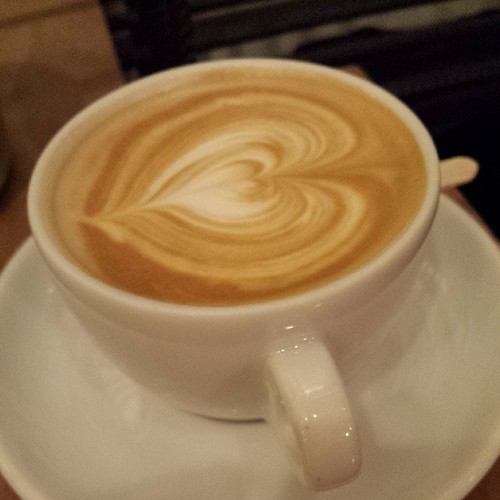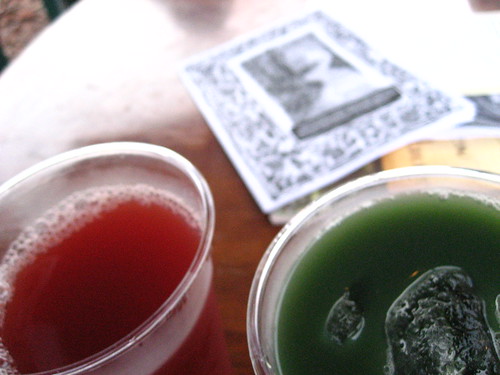 |
| Coffee from Chye Seng Huat Hardware Store, Singapore. |
IARC Monographs have come to some conclusions on the dangers of drinking coffee, maté, and very hot beverages. An international working group of 23 scientists convened by the International Agency for Research on Cancer (IARC), the cancer agency of the World Health Organization (WHO), has evaluated the carcinogenicity of drinking coffee, maté* and very hot beverages. The IARC aims to coordinate and conduct research on the causes of human cancer and the mechanisms of carcinogenesis, and to develop scientific strategies for cancer control.
A summary of the final evaluations is published in The Lancet Oncology, and the detailed assessments will be published as Volume 116 of the IARC Monographs. The working group found no conclusive evidence for a carcinogenic effect of drinking coffee. However, the experts did find that drinking very hot** beverages probably causes cancer of the oesophagus in humans. No conclusive evidence was found for drinking maté at temperatures that are not very hot.
“These results suggest that drinking very hot beverages is one probable cause of oesophageal cancer and that it is the temperature, rather than the drinks themselves, that appears to be responsible, ” says Dr Christopher Wild, IARC Director.
Very hot beverages
Drinking very hot beverages was classified as probably carcinogenic to humans. This was based on limited evidence from epidemiological studies that showed positive associations between cancer of the oesophagus and drinking very hot beverages. Studies in places such as China, Iran, Turkey, and South America, where tea or maté is traditionally drunk very hot (at about 70°C) , found that the risk of oesophageal cancer increased with the temperature at which the beverage was drunk.
In experiments involving animals, there was also limited evidence for the carcinogenicity of very hot water, the working group found.
“Smoking and alcohol drinking are major causes of oesophageal cancer, particularly in many high- income countries,” stresses Dr Wild. “However, the majority of oesophageal cancers occur in parts of Asia, South America, and East Africa, where regularly drinking very hot beverages is common and where the reasons for the high incidence of this cancer are not as well understood.”
Oesophageal cancer is the eighth most common cause of cancer worldwide and one of the main causes of cancer death, with approximately 400,000 deaths recorded in 2012 (5% of all cancer deaths), says the WHO. The proportion of oesophageal cancer cases that may be linked to drinking very hot beverages is not known.
 |
| Hibiscus maté on the left, guarana ginseng on the right - drinks at the Woodford Folk Festival in Queensland, Australia, 2006. |
Cold maté did not have carcinogenic effects in experiments on animals or in epidemiological studies. Therefore, drinking maté at temperatures that are not very hot was not classifiable as to its carcinogenicity to humans. This was based on inadequate evidence in humans for the carcinogenicity of drinking cold or warm maté and inadequate evidence in experimental animals for the carcinogenicity of cold maté as a drinking liquid*.
Coffee
Drinking coffee was not classifiable as to its carcinogenicity to humans. The large body of evidence currently available led to the reevaluation of the carcinogenicity of coffee drinking, previously classified as possibly carcinogenic to humans by IARC in 1991. After thoroughly reviewing more than 1,000 studies in humans and animals, the working group found that there was inadequate evidence for the carcinogenicity of coffee drinking overall. Many epidemiological studies showed that coffee drinking had no carcinogenic effects for cancers of the pancreas, female breast, and prostate, and reduced risks were seen for cancers of the liver and uterine endometrium. For more than 20 other cancers, the evidence was inconclusive.
A scan of research online showed pretty much the same conclusions. In one 2009 study in Iran, researchers found that compared with drinking lukewarm or warm tea, drinking hot tea or very hot tea was associated with an increased risk of oesophageal cancer. For this study, temperatures of warm, hot and very hot tea were defined as being under 60°C, between 61 and 64°C, and 65°C and above respectively. Various confounders such as ethnicity, daily vegetable intake, alcohol consumption, tobacco or opium use, duration of residence in rural areas, and socioeconomic status were ruled out as likely causes. The total amount of tea consumed did not have an effect, either.
A 1995 study on maté in Paraguay linked very hot maté to oesophageal cancer. The authors of the research pointed out however that alcohol consumption, smoking, and eating of beef were also linked to the same cancer. The association between very hot maté and cancer was also found in a 2000 study, which also noted that the more maté is consumed, the higher the risk of oesophageal cancer. Women were found to have a higher risk of the cancer on all counts. The good news is that eating fruit, vegetables, cereals and drinking tea has a protective effect, but meat, animal fats and salt led to an increased cancer risk.
In 2011, a study in Southern China linked not only the drinking of very hot beverages to cancer, but also the eating of high-temperature foods - those which had been fried or barbecued. Eating fast was also correlated with cancer.
The IARC Monographs Programme seeks to classify cancer hazards, meaning the potential of any substance to cause cancer based on current knowledge. The classification does not indicate what level of risk exists to people’s health associated with exposure to a classified hazard. For example, IARC has classified tobacco smoking as carcinogenic to humans, but that classification does not indicate the increase in risk for each cigarette smoked. This working group evaluation is in line with the WHO Technical Report Series 916 on diet, nutrition and the prevention of chronic diseases, which states that people should not consume drinks when they are at a very hot (scalding hot) temperature.
A 2015 study postulates that the stem cell division model of cancer can explain why very hot foods and beverages cause cancer. Swallowing something too hot will damage cells in the oesophagus. Stem cell division is activated to repair the cells, and the more often stem cells divide over a period of time, the higher the risk of DNA damage, and in turn cancer. The author, Miguel López-Lázaro, further speculates that controlling stem cell divisions, such as through taking a daily low dose aspirin, could reduce cancer rates and reduce the likelihood of dying from cancer.
Interested?
Read the IARC Monographs Q&A on classifications (PDF)
Read the IARC Monographs Q&A on the evaluation of drinking coffee, maté, and very hot beverages (PDF)
*Maté, also called yerba maté, is an infusion made from dried leaves of ilex paraguariensis. It is consumed mainly in South America and to a lesser extent in the Middle East, Europe, and North America. It is also available as a health supplement in Singapore. Maté is traditionally drunk very hot (at about 70°C), but it may also be consumed warm or cold.
**“Very hot” refers to any beverages consumed at a temperature above 65°C. See the Q&A for more details.